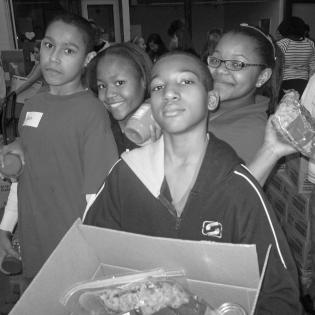Soup to Nuts
In this lesson, young people identify idioms in the book Uncle Willie and the Soup Kitchen. They discuss the meanings of idioms and talk about hurtful language in the literal meaning of some idioms. They may playfully modify idioms to reflect a philanthropic heart.
The learner will:
- define and identify idioms.
- read-aloud copy of Uncle Willie and the Soup Kitchen
Talk with family members about idioms they use, getting ideas from the examples from the handout: Take Home List.
- Disalvo-Ryan, Dyanne. Uncle Willie and the Soup Kitchen. Harper Trophy, 1997. ISBN: 0688152856
Instructions
Anticipatory Set:
Ask young people what the phrase "knock it off" means. Draw out of them both the literal and assigned meaning.
The definition of an idiom is an expression that cannot be understood by the individual meanings of its parts. For example, "knock it off" doesn't mean to actually push something off a table. Talk about examples such as "don't beat around the bush" and "feeling under the weather." When you give an example, playfully ask young people to picture and describe a literal translation of the parts, which doesn't make sense. Can they come up with other idioms? See the handout below: Oodles of Idioms.
For fun, they may "quick draw" an illustration of an idiom, especially the ones from the book Uncle Willie and the Soup Kitchen. See the handout Take Home List. Neuro-divergent or ELL young people may work in pairs for this activity.
Discuss which idioms may seem harsh or unkind. When taken literally, these do not show respect for each other or reflect a philanthropic heart.
For example, "kill two birds with one stone" seems cruel to nature. "Feed two birds with one hand" is generous and gives the same meaning.
The handout Don't Break My Heart may be completed in small groups to play around with a kinder version of familiar idioms.
Provide time for groups to share their playful modifications with the whole group.
Read Uncle Willie and the Soup Kitchen aloud and have young people listen for the idioms used in the text.
Philanthropy Framework
-
Strand PHIL.II Philanthropy and Civil Society
-
Standard PCS 02. Diverse Cultures
-
Benchmark E.2 Discuss the importance of respect for others.
-
Benchmark E.4 Demonstrate listening skills.
-
-
-
Strand PHIL.IV Volunteering and Service
-
Standard VS 03. Providing Service
-
Benchmark E.3 Describe the task and the student role.
-
-
